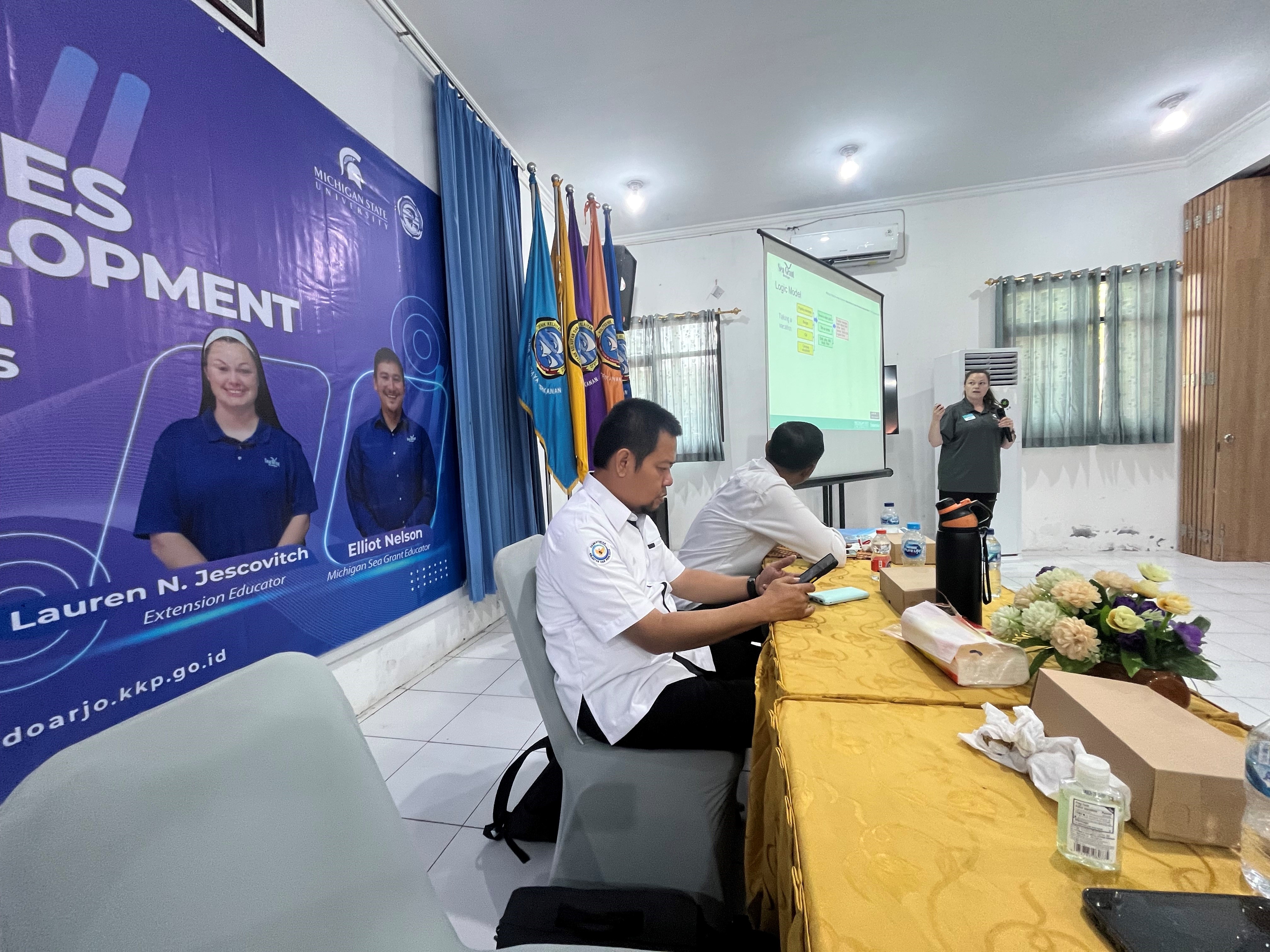Michigan Sea Grant Extension educators explore Indonesia’s Fisheries Extension Program
Educators also share how MSU Extension uses logic models and backward design to develop programs.

Indonesia is the world’s second-largest producer of aquaculture products with a total annual production of 15.9 million metric tons, according to Food and Agriculture Organization of the United Nations. Indonesia embraces this bounty; they view aquaculture as a positive job or activity, as exciting and forward thinking, and necessary to access food security. Although Indonesia is prolific in fisheries and seafood Extension and research, there are very few impact statements available of their programs. As Michigan State University Extension educators we, Lauren Jescovitch and Elliot Nelson, visited Indonesia to continue partnership building, and to share implementation of backwards design in our extension programs .
MSU Extension and logic models
In summer 2024, we offered workshops on the theory of backwards design and the use of the logic model tool in the context of a fisheries Extension program to hundreds of Indonesia’s Extension officers and students. These workshops spurred discussions on implementation throughout Indonesia’s Fisheries Extension program and led to fruitful discussions to strengthen extension efforts on aquaculture literacy and workforce development.

We traveled across the island of Java and held four workshops to educational institutions within the Ministry of Marine Affairs including “How to be a good Extension agent,” and “Human Resources Competency Development: Transformation and innovation in marine and fisheries sectors.” During these workshops, we were able to showcase the theory of backwards design, explain how to use the logic model framework to design an educational program, and showcased the Mi Fresh Fish project as a case study for implementation. In addition, we learned much about workforce development from the Indonesian educations system.
Unique framework
What was unique about Indonesia’s educational framework is that the federal government has 12 colleges and universities that focus on specific career paths in topics within fisheries, aquaculture, and processing, and extension. For example, in Bogor, the University has a Fisheries Extension degree in which students go to school to become Extension agents. These students also participated in our workshop and started to write their own logic models that would align to their school research projects. Discussions around implementation and communication of extension impact around fisheries and aquaculture were prominent after these workshops. Conversations are ongoing in hope of development and research of using the theory of backwards design and the logic model to improve Indonesia’s Fisheries Extension programs.
Technical training begins in high school
Training in Indonesia sometimes even starts at the high school level. We were able to visit a fisheries and aquaculture high school technical program. At these specialized boarding schools, students receive two years of technical training in either fisheries, aquaculture, marine science or engineering. MI Sea Grant was able to interview these students about the ways their high school life contains both differences and similarities to American high schoolers. We plan to showcase the interviews along with Indonesia Aquaculture facilities in this year's Aquaculture Challenge program. The Aquaculture Challenge is a competitive high school program run by Michigan Sea Grant and Lake Superior State University. Our hope is that in future years Indonesian and American students will be able to learn from each other with cross cultural opportunities.
360 virtual reality tours
While traveling, we continue to capture 360 virtual reality (VR) videos of various aquaculture farms. Various systems and species were included such as: a saline Nile Tilapia farm with intensive ponds; marine ponds with shrimp, barramundi, and blue crab; and intensive biofloc shrimp farms and multitrophic systems. These videos will be developed into 360 VR tours that will enhance training in the Aquaculture Challenge curriculum in the future. Our travel was made possible through a National Sea Grant travel grant.
Through our Michigan Sea Grant work, we support U.S. aquaculture and fisheries industry and help raise awareness of the importance of seafood for national and global food security. The collaborations with Indonesian Aquaculture experts are not ending. Soon a delegation will travel to the U.S. for further learning and collaboration, and we plan to continue the partnership to enhance both countries ability to meet the seafood needs of their people.
Michigan Sea Grant helps to foster economic growth and protect Michigan’s coastal, Great Lakes resources through education, research, and outreach. A collaborative effort of the University of Michigan and Michigan State University and its MSU Extension, Michigan Sea Grant is part of the NOAA-National Sea Grant network of 34 university-based programs.
This article was prepared by Extension educator Lauren N. Jescovitch and Elliot Nelson under award NA22OAR4170084 sub no SUBK00019610 from the National Oceanic and Atmospheric Administration, U.S. Department of Commerce through the Regents of the University of Michigan. The statements, findings, conclusions, and recommendations are those of the author(s) and do not necessarily reflect the views of the National Oceanic and Atmospheric Administration, the Department of Commerce, or the Regents of the University of Michigan.



 Print
Print Email
Email

